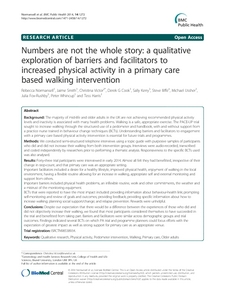Normansell, R; Smith, J; Victor, C; Cook, DG; Kerry, S; Iliffe, S; Ussher, M; Fox-Rushby, J; Whincup, P; Harris, T
(2014)
Numbers are not the whole story: a qualitative exploration of barriers and facilitators to increased physical activity in a primary care based walking intervention.
BMC Public Health, 14.
ISSN 1471-2458
https://doi.org/10.1186/1471-2458-14-1272
SGUL Authors: Cook, Derek Gordon Harris, Teresa Jane Kerry, Sally Margaret Ussher, Michael Henry Whincup, Peter Hynes Normansell, Rebecca Alice
![[img]](https://openaccess.sgul.ac.uk/107361/1.hassmallThumbnailVersion/Numbers_not_whole_story_qualitative_exploration_barriers_to_increased_physical_activity.pdf)  Preview |
|
["document_typename_application/pdf; charset=binary" not defined]
Published Version
Download (433kB)
| Preview
|
Abstract
BACKGROUND: The majority of mid-life and older adults in the UK are not achieving recommended physical activity levels and inactivity is associated with many health problems. Walking is a safe, appropriate exercise. The PACE-UP trial sought to increase walking through the structured use of a pedometer and handbook, with and without support from a practice nurse trained in behaviour change techniques (BCTs). Understanding barriers and facilitators to engagement with a primary care based physical activity intervention is essential for future trials and programmes.
METHODS: We conducted semi-structured telephone interviews using a topic guide with purposive samples of participants who did and did not increase their walking from both intervention groups. Interviews were audio-recorded, transcribed and coded independently by researchers prior to performing a thematic analysis. Responsiveness to the specific BCTs used was also analysed.
RESULTS: Forty-three trial participants were interviewed in early 2014. Almost all felt they had benefitted, irrespective of their change in step-count, and that primary care was an appropriate setting.Important facilitators included a desire for a healthy lifestyle, improved physical health, enjoyment of walking in the local environment, having a flexible routine allowing for an increase in walking, appropriate self and external monitoring and support from others.Important barriers included physical health problems, an inflexible routine, work and other commitments, the weather and a mistrust of the monitoring equipment.BCTs that were reported to have the most impact included: providing information about behaviour-health link; prompting self-monitoring and review of goals and outcomes; providing feedback; providing specific information about how to increase walking; planning social support/change; and relapse prevention. Rewards were unhelpful.
CONCLUSIONS: Despite our expectation that there would be a difference between the experiences of those who did and did not objectively increase their walking, we found that most participants considered themselves to have succeeded in the trial and benefitted from taking part. Barriers and facilitators were similar across demographic groups and trial outcomes. Findings indicated several BCTs on which PA trial and programme planners could focus efforts with the expectation of greatest impact as well as strong support for primary care as an appropriate venue.
| Item Type: |
Article
|
| Additional Information: |
© 2014 Normansell et al.; licensee BioMed Central. This is an Open Access article distributed under the terms of the Creative Commons Attribution License (http://creativecommons.org/licenses/by/4.0), which permits unrestricted use, distribution, and reproduction in any medium, provided the original work is properly credited. The Creative Commons Public Domain Dedication waiver (http://creativecommons.org/publicdomain/zero/1.0/) applies to the data made available in this article, unless otherwise stated. |
| Keywords: |
Qualitative research, Physical activity, Pedometer intervention, Walking, Primary care, Older adults, Public Health, 1117 Public Health And Health Services |
| SGUL Research Institute / Research Centre: |
Academic Structure > Population Health Research Institute (INPH) |
| Journal or Publication Title: |
BMC Public Health |
| Article Number: |
1272 |
| ISSN: |
1471-2458 |
| Language: |
eng |
| PubMed ID: |
25511452 |
| Web of Science ID: |
WOS:000348607200001 |
| Dates: |
| Date |
Event |
| 2014-12-15 |
Published |
|
 |
Go to PubMed abstract |
| URI: |
https://openaccess.sgul.ac.uk/id/eprint/107361 |
| Publisher's version: |
https://doi.org/10.1186/1471-2458-14-1272 |
Statistics
Item downloaded times since 16 Mar 2015.
Actions (login required)
 |
Edit Item |



